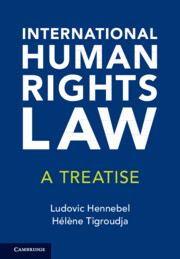Book contents
- International Human Rights Law
- International Human Rights Law
- Copyright page
- Dedication
- Contents
- About the Authors
- Acknowledgments
- Note on the Text
- Table of Cases
- Abbreviations
- Part I Foundations of International Human Rights Law
- Part II The Machinery of International Human Rights Law
- Part III The Interpretation of International Human Rights Law
- Title 6 The Hermeneutics of International Human Rights Organs
- 21 The Interpreters of International Human Rights Law
- 22 The Interpretation of International Human Rights Law
- Title 7 International Legal Regime of Human Rights and Freedoms
- Title 8 Rights and Freedoms
- Part IV Remedies and Implementation of International Human Rights Decisions
21 - The Interpreters of International Human Rights Law
from Title 6 - The Hermeneutics of International Human Rights Organs
Published online by Cambridge University Press: 10 April 2025
- International Human Rights Law
- International Human Rights Law
- Copyright page
- Dedication
- Contents
- About the Authors
- Acknowledgments
- Note on the Text
- Table of Cases
- Abbreviations
- Part I Foundations of International Human Rights Law
- Part II The Machinery of International Human Rights Law
- Part III The Interpretation of International Human Rights Law
- Title 6 The Hermeneutics of International Human Rights Organs
- 21 The Interpreters of International Human Rights Law
- 22 The Interpretation of International Human Rights Law
- Title 7 International Legal Regime of Human Rights and Freedoms
- Title 8 Rights and Freedoms
- Part IV Remedies and Implementation of International Human Rights Decisions
Summary
This chapter discusses the various interpreters of international human rights law, including international courts, regional courts, and domestic courts. It examines their roles, authority, and the plurality of interpreters in the human rights legal framework. The chapter explores how different judicial and quasi-judicial bodies contribute to the development and interpretation of human rights norms. It also highlights the challenges and opportunities in achieving coherence and consistency in the interpretation of human rights law across different jurisdictions. The chapter emphasizes the importance of collaboration and dialogue among interpreters to enhance the protection of human rights.
Keywords
- Type
- Chapter
- Information
- International Human Rights LawA Treatise, pp. 443 - 451Publisher: Cambridge University PressPrint publication year: 2025

